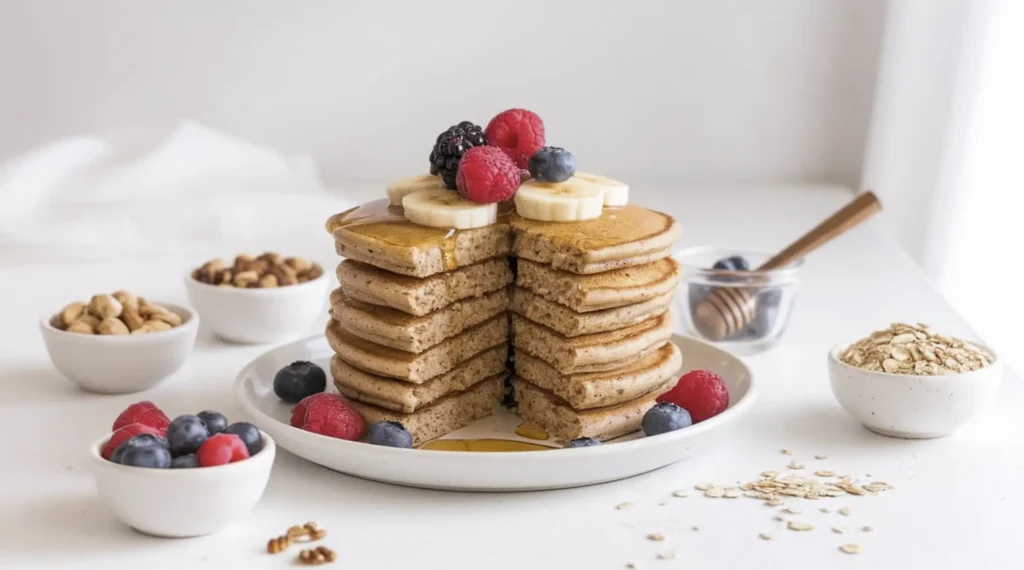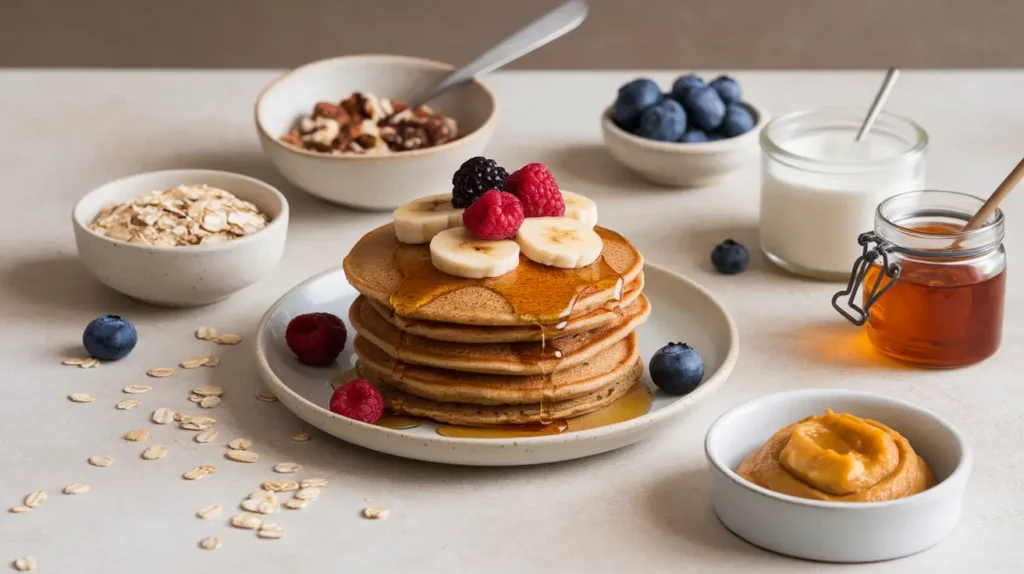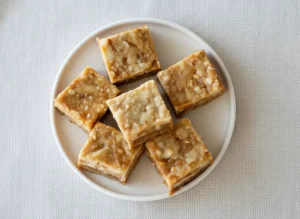Pancakes are among the most cherished breakfast options, offering comfort, warmth, and a world of flavors. But the question remains: Are pancakes healthy? The answer, as you might expect, depends on various factors such as ingredients, preparation methods, and serving choices. Above all, pancakes can be part of a healthy diet with thoughtful customization.
For instance, traditional pancakes made with refined flour and sugar may not offer the best nutritional profile. However, with a few adjustments, such as swapping refined flour for whole grains and incorporating natural sweeteners, pancakes can become a nutritious addition to your breakfast routine. Furthermore, the toppings you choose—like fresh fruits, yogurt, or nuts—can significantly enhance their health benefits.
In addition, pancakes’ versatility allows them to fit into various dietary preferences, whether you’re gluten-free, vegan, or looking for high-protein options. This adaptability makes them a favorite worldwide, from American-style fluffy pancakes to savory Asian variations.
In conclusion, are pancakes healthy? Yes, they can be, provided you make mindful ingredient choices and balance your meal with nutrient-rich sides. In this comprehensive guide, we’ll dive deep into pancake nutrition, share tips for making them healthier, and explore creative variations for an elevated breakfast experience.
What Are Pancakes Made Of?
In general, pancakes are made using a simple combination of flour, eggs, milk, sugar, baking powder, and butter. These basic ingredients come together to form a smooth batter that is cooked on a griddle or pan. But are pancakes healthy when made with these traditional ingredients? It depends on how you prepare them and what you add to the mix.
For instance, modern pancake recipes often include healthier substitutions such as whole-grain flours, plant-based milk, or natural sweeteners like honey or mashed bananas. These swaps can increase the fiber, vitamins, and minerals in your pancakes while reducing refined sugars and empty calories.
Moreover, pancakes are incredibly versatile. You can enhance their nutritional value by adding nutrient-dense ingredients like chia seeds, flaxseeds, or shredded zucchini to the batter. Similarly, topping your pancakes with fresh fruits, nuts, or Greek yogurt provides an extra boost of nutrients and flavor.
In short, are pancakes healthy? The answer largely depends on the ingredients used and how you choose to prepare them. Thoughtful additions and mindful substitutions can turn a classic recipe into a nutritious and satisfying breakfast. If you’re looking for inspiration, don’t miss this Fluffy American Pancake Recipe to start your pancake journey.
The Nutritional Breakdown: Are Pancakes Healthy?

To determine are pancakes healthy, it’s essential to examine their nutritional components. Traditional pancakes provide energy from carbohydrates but often lack other vital nutrients. However, with a few simple adjustments, pancakes can become a wholesome and balanced breakfast option.
Calories and Macronutrients
Calories: A serving of two medium-sized pancakes contains around 200–350 calories, depending on the ingredients and toppings.
Carbohydrates: Pancakes are carbohydrate-rich, typically offering 30–40 grams per serving, making them an excellent source of quick energy.
Protein and Fat: Standard pancakes provide about 5–8 grams of protein and 5–10 grams of fat per serving. These values can be improved by adding nutrient-dense ingredients like nuts, seeds, or protein powder.
Fortifying Pancakes for Better Nutrition
Pancakes can be made more nutritious by using almond or oat flour instead of regular flour. These alternatives boost the fiber and healthy fat content, supporting better digestion and heart health. Additionally, swapping refined sugar for natural options like mashed bananas, honey, or maple syrup improves flavor and reduces empty calories.
Conclusion: Are Pancakes Healthy?
Are pancakes healthy? Yes, when you make mindful ingredient choices and use nutrient-dense toppings. Pair pancakes with protein-rich sides like eggs or Greek yogurt to create a balanced meal. For a creative twist, try this Pancake Breakfast Casserole to elevate your breakfast routine.
How to Store and Reheat Pancakes
Knowing how to properly store and reheat pancakes can help you minimize food waste and enjoy a quick, delicious breakfast with ease on busy mornings. In fact, pancakes are an excellent make-ahead meal that can be refrigerated or frozen for later use without compromising their quality. But how does this factor into the question, “Are pancakes healthy?” Proper storage and reheating methods ensure that your pancakes maintain their taste and texture while reducing food waste—a win for both convenience and sustainability.
For storing in the refrigerator, first, allow the pancakes to cool completely. Then, stack them in an airtight container to keep them fresh for up to three days. For longer-term storage, freeze the pancakes. Stack them with a sheet of parchment paper between each one and place them in a freezer-safe bag. This technique prevents the pancakes from sticking together and makes reheating a breeze.
When reheating, a skillet over low heat is the best method to retain the pancakes’ original texture and flavor. Alternatively, a toaster works well for quick reheating and helps maintain a slightly crisp exterior. While a microwave is the fastest option, be cautious, as it can make the pancakes dry or rubbery if overheated.
In short, mastering storage and reheating ensures your pancakes are always ready to enjoy. This convenience, paired with nutritious ingredients, contributes to a positive answer to the question, “Are pancakes healthy?”
Creative Pancake Variations

Pancakes are endlessly customizable, offering opportunities to experiment with flavors and ingredients to suit various dietary needs. So, are pancakes healthy? Yes, they can be, especially when tailored to your preferences and nutritional goals.
1. Gluten-Free Pancakes
For instance, using almond or coconut flour as a base makes pancakes gluten-free. Additionally, incorporating almond milk and a splash of vanilla extract elevates the flavor while keeping the recipe light and healthy.
2. Vegan Pancakes
For plant-based eaters, substitute eggs with flaxseed or chia seeds mixed with water, known as “vegan eggs.” Moreover, plant-based milk options and a neutral oil like avocado oil make this variation suitable for vegans without compromising taste or texture.
3. High-Protein Pancakes
Enhance your pancakes with protein powder, Greek yogurt, or cottage cheese to increase their protein content. Similarly, sprinkle in nuts, seeds, or even a dollop of peanut butter for added crunch and a nutritional boost.
4. Savory Pancakes
For a creative twist, mix ingredients like spinach, cheese, and fresh herbs into the batter. As a result, these savory pancakes are perfect for brunch or even as a light dinner option.
In conclusion, these variations showcase how versatile and adaptable pancakes can be. By focusing on wholesome ingredients, the answer to “Are pancakes healthy?” is undoubtedly yes.
The Role of Toppings in Pancake Nutrition
Toppings are more than just a garnish—they can either elevate the health benefits of your pancakes or turn them into a calorie-laden treat. To answer the question, “Are pancakes healthy?” it’s essential to consider what you add on top.
For instance, fresh fruits like berries, banana slices, or chopped apples make excellent toppings. These provide natural sweetness, essential vitamins, and antioxidants without the need for refined sugars. Similarly, a dollop of Greek yogurt adds creaminess while boosting protein content, making your pancakes more satisfying and nutritionally balanced.
On the other hand, high-calorie toppings such as whipped cream, chocolate syrup, or excessive butter should be limited. In contrast to nutrient-rich options, these can increase the sugar and fat content significantly, making your meal less healthy overall.
For a balanced approach, consider using nuts, seeds, or a drizzle of natural nut butter for added texture and nutrients. In addition, flaxseeds or chia seeds are excellent choices to sprinkle on top, providing omega-3 fatty acids and fiber. Consequently, these nutrient-packed additions can transform your pancakes into a wholesome and well-rounded breakfast.
In summary, thoughtful topping choices can make all the difference. By selecting fresh and nutrient-dense options, the answer to “Are pancakes healthy?” can be a resounding yes.
Are Pancakes Healthy for Everyday Breakfast?
While pancakes can fit into a balanced diet, eating them every day may not provide the variety of nutrients your body needs. A common question is, “Are pancakes healthy?” The answer depends on the ingredients and how they are incorporated into your overall diet.
Traditional pancake recipes, often made with refined flour and sugar, can lead to higher calorie and sugar intake over time. In addition, relying on pancakes as a daily breakfast without incorporating other food groups might result in a lack of essential nutrients like protein, fiber, and healthy fats.
However, pancakes can be part of a healthy routine when prepared thoughtfully. For instance, using whole-grain flours, natural sweeteners, and healthy fats like olive oil or avocado can transform pancakes into a nutrient-packed option. Moreover, pairing your pancakes with sides like fresh fruits, eggs, or a dollop of Greek yogurt adds balance and boosts the nutritional profile.
It’s also worth exploring variations, such as savory pancakes, to bring diversity to your meals. By rotating different recipes and incorporating various toppings, you can create a well-rounded breakfast experience.
In conclusion, are pancakes healthy for daily breakfast? While they can be, moderation and mindful ingredient choices are key to ensuring they support a balanced diet.
Why Pancakes Are a Universal Favorite
Pancakes hold a special place in the hearts of people worldwide, thanks to their adaptability and cultural significance. But beyond their delicious appeal, are pancakes healthy? Their versatility offers endless opportunities to make them both enjoyable and nutritious.
For example, American pancakes are loved for their fluffiness and are often served with syrup. On the other hand, French crepes are thin and delicate, perfect for both sweet and savory fillings. Similarly, Asian varieties like dosa or scallion pancakes provide unique flavors and textures rooted in their local traditions.
Moreover, pancakes are highly customizable to meet diverse dietary needs. Gluten-free versions made with almond or coconut flour cater to those with gluten intolerance, while vegan recipes using flaxseed or chia seeds appeal to plant-based eaters. Above all, pancakes’ simplicity allows for endless creative possibilities, whether you’re experimenting with new ingredients or adding toppings to suit your taste.
Their universal appeal lies in their ability to adapt. In short, pancakes are not just a meal; they’re a canvas for culinary creativity, making them a favorite across cultures and generations. Whether you’re enjoying them in the morning or as a savory dish for dinner, they offer something for everyone.
FAQs:
What Do You Need To Make Pancakes?
To make pancakes, you need basic kitchen staples: flour, sugar, baking powder, milk, eggs, and butter. These ingredients form the foundation of any pancake recipe. Additionally, optional ingredients like vanilla extract can enhance the batter’s flavor, adding warmth and aroma. For toppings, popular choices include fresh fruits, whipped cream, or maple syrup to complement the pancakes.
It’s worth noting that ingredient quality plays a vital role. For instance, using fresh baking powder ensures the pancakes rise properly, while high-quality butter adds a rich, velvety texture. With these essentials, you’ll have everything you need to create a delightful pancake recipe that’s both simple and versatile.
What Makes Pancake Recipe Soft And Fluffy?
Soft and fluffy pancakes are the result of several factors working together. First, the leavening agent—usually baking powder—creates bubbles in the batter, making the pancakes rise as they cook. In addition, minimal mixing helps prevent over-developing gluten, which can make pancakes dense and tough.
Another crucial step is allowing the batter to rest for 5–10 minutes before cooking. During this time, the gluten relaxes, and the baking powder activates, resulting in an airy, tender texture. Above all, using room-temperature ingredients ensures that the batter mixes evenly and cooks consistently, further enhancing the fluffiness of your pancake recipe.
What Are Pancakes Recipe Made Of?
Pancakes are made from a simple mixture of flour, milk, eggs, butter, sugar, and baking powder. These ingredients combine to form a smooth batter that transforms into soft, golden cakes when cooked on a griddle. Each component plays a role—flour provides structure, milk adds moisture, and eggs contribute to richness. Butter enhances the flavor, while baking powder gives the pancakes their signature fluffiness.
What Makes Pancakes Recipe Not Fluffy?
Pancakes may turn out dense or flat if certain steps are missed during preparation. Overmixing the batter is a common culprit, as it activates too much gluten, resulting in chewy pancakes. Similarly, expired or insufficient baking powder can hinder the rise, leaving your pancakes flat.
Using cold ingredients can also affect the batter’s consistency, leading to uneven cooking. To achieve the best results, always use room-temperature ingredients, fresh leavening agents, and allow the batter to rest before cooking. By following these practices, you’ll ensure that your pancake recipe consistently produces fluffy and tender pancakes.
Make Your Own Perfect Pancakes!
Ready to create the ultimate breakfast treat? Dive into our step-by-step guide to making the fluffiest, softest, and most delicious pancakes that will delight everyone at the table.
From ingredient tips to expert techniques, we’ve got everything you need to whip up a stack of pancakes that are golden, airy, and full of flavor. Whether it’s for a cozy weekend breakfast or a special brunch, this recipe will never disappoint.
Start flipping your way to pancake perfection today!
Conclusion: Are pancakes healthy?

So, are pancakes healthy? The answer ultimately depends on your choices. When made with nutrient-rich ingredients like whole grains, fresh fruits, and healthy fats, pancakes can fit seamlessly into a balanced diet. Above all, by avoiding excessive sugar and refined flour, you can transform this beloved breakfast into a wholesome, satisfying meal.
Pancakes’ versatility is what makes them so exciting. You can experiment with different recipes, toppings, and styles to suit your preferences and nutritional goals. For example, try this Homemade Pancakes Recipe to master a classic, or explore creative ideas like adding nuts, seeds, or fruit to your batter. If you enjoy simpler everyday options, this Everyday Pancakes Recipe offers a quick and satisfying way to enjoy pancakes while keeping them nutritious.
Whether you’re craving a fluffy stack of traditional pancakes or exploring international variations, they can be as indulgent or health-conscious as you want them to be.
In conclusion, pancakes are more than just a breakfast item—they’re a universal comfort food that brings joy to the table. With thoughtful preparation and the right recipes, you can enjoy them guilt-free while confidently answering the question, “Are pancakes healthy?” with a resounding yes!




